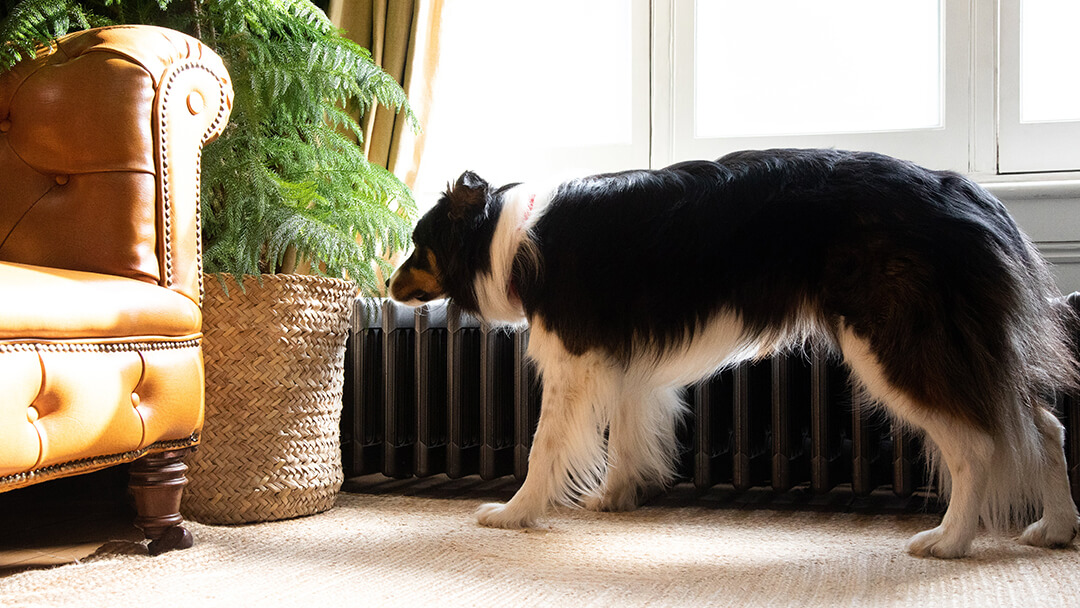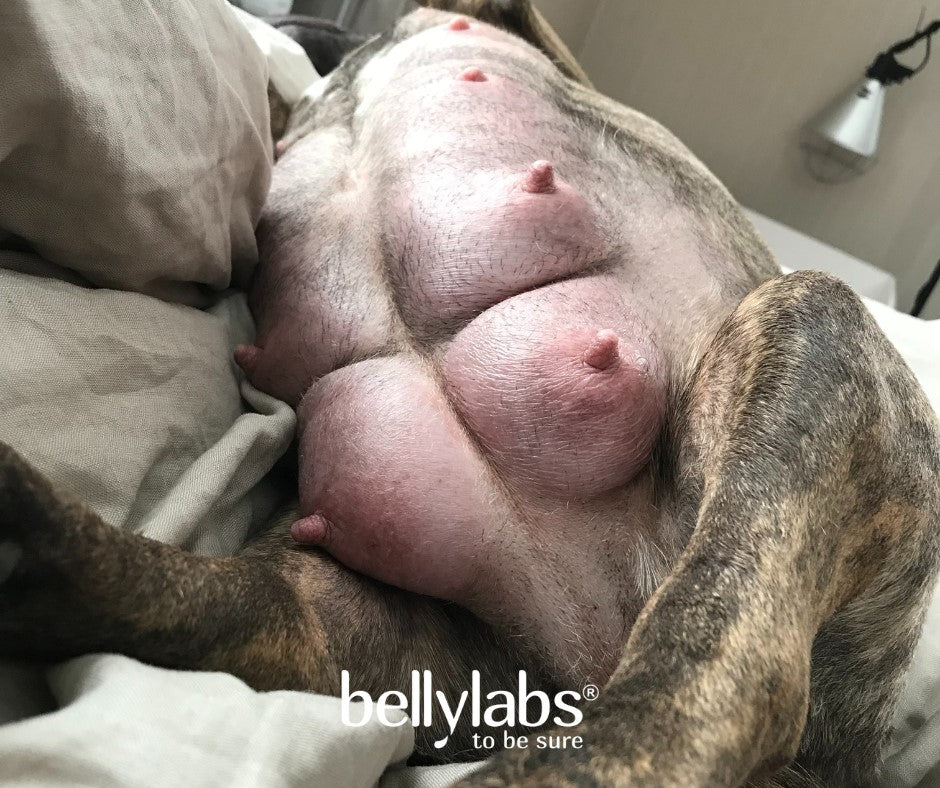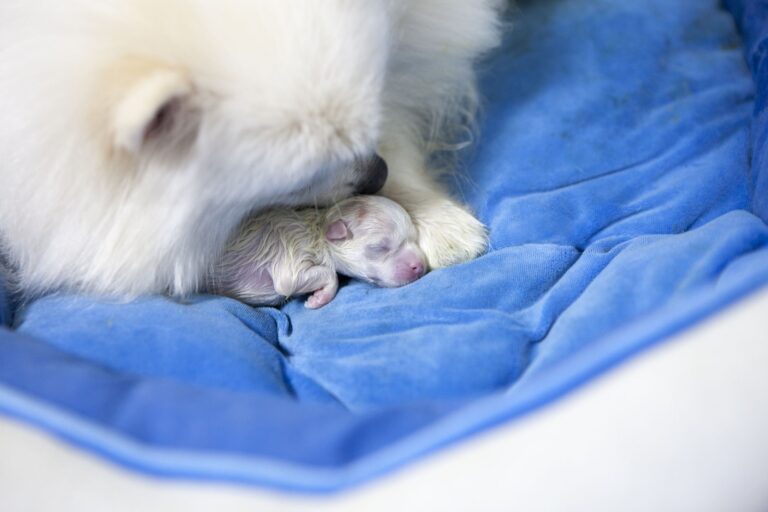Signs that a dog is going into labor soon includes discharge, restlessness, temperature drop, loss of appetite, nesting, panting, licking the genitals, shivering, and uterine contraction. When a dog is close to labor, vaginal discharge may range from clear to white, and the presence of a clear or white sac protruding from the vulva indicates imminent whelping.
Green discharge indicates placental separation. After a drop in temperature, restlessness and anxiety may occur, accompanied by panting, pacing, refusal of food, and possibly vomiting. This is the time to place the dog in the whelping box and prepare for labor.
Another common sign is vomiting during labor.

Credit: www.purina.co.uk
Understanding Dog Labor
As labor approaches, dogs may exhibit signs such as clear to white vaginal discharge, restlessness, temperature drop, loss of appetite, nesting, panting, licking the genitals, shivering, and uterine contractions. These behaviors indicate that the dog is going into labor soon.
Stages Of Dog Labor
Understanding the stages of dog labor can help you prepare for the exciting arrival of new puppies. Dog labor typically consists of three stages:
- Stage One: In this stage, the dog may experience restlessness, panting, pacing, and a drop in body temperature. This is often a sign that labor is approaching.
- Stage Two: This is the active stage of labor where the puppies are born. The mother dog will exhibit contractions, and you will start to see the puppies being delivered.
- Stage Three: After the puppies are born, the mother will pass the placenta and continue to have contractions to expel any remaining fluid.
Signs Of Approaching Labor
Dogs show several signs when labor is approaching:
- Vaginal Discharge: Before birth, dogs may have a clear to white vaginal discharge. If you notice a clear or white sac protruding from the vulva, whelping should be imminent. However, if you see green discharge, it indicates placental separation and should be followed immediately by a fetus.
- Temperature Drop: A significant drop in the dog’s body temperature is an indication that labor is near. Keep an eye on your dog’s temperature to anticipate when labor might begin.
- Loss of Appetite: Before labor, dogs may have a decrease in appetite as a natural instinct to prepare for delivery.
- Nesting Behavior: Dogs instinctively seek out a safe and comfortable space to give birth. If you observe your dog nesting and rearranging bedding, it’s a sign that labor is approaching.
- Panting: Panting is another common sign that labor is imminent. The dog may pant heavily and have difficulty getting comfortable.
- Licking the Genitals: Dogs may lick their genitals more frequently as labor approaches. This is a natural instinct to clean and prepare for delivery.
- Shivering: Some dogs may shiver or tremble before labor. It is important to make sure your dog is warm and comfortable during this time.
- Uterine Contractions: As labor progresses, you may notice your dog’s abdomen contracting, signaling that she is in the active stage of labor.
Behavioral Changes During Labor
During the labor process, you will observe the following behavioral changes in your dog:
- Restlessness and Anxiety: After the temperature drop, dogs may become restless, anxious, and exhibit pacing behaviors. They may also refuse food and may vomit.
- Nesting Behavior: As labor gets closer, dogs will exhibit nesting behavior, attempting to create a comfortable space for the delivery of the puppies. It is essential to place her in the whelping box during this stage.
Vaginal Discharge As A Sign Of Labor
When a dog is going into labor soon, one of the signs to look out for is vaginal discharge. This discharge may appear clear to white, and if a clear or white sac is protruding from the vulva, whelping is imminent.
It’s important to monitor any unusual discharge and contact a veterinarian if there are concerns.
Appearance Of Vaginal Discharge
During the late stages of pregnancy, a dog may experience vaginal discharge as a sign that she is going into labor soon. The appearance of this discharge can vary depending on the stage of labor and can be an important indicator of what is happening internally.Differentiating Normal Vs. Abnormal Discharge
It is essential for dog owners to be able to differentiate between normal and abnormal vaginal discharge during labor. Normal discharge is typically clear to white in color and may increase in volume as labor progresses. This discharge is a result of the cervix dilating and the birth canal preparing for delivery.On the other hand, abnormal discharge such as yellow or foul-smelling discharge may indicate an infection and should be promptly addressed by a veterinarian. It is crucial to monitor the dog closely and seek professional advice if any abnormal discharge is observed.Green Discharge And Placental Separation
One specific type of abnormal discharge to watch out for during dog labor is green discharge. Green discharge may indicate placental separation, where the placenta detaches from the uterine wall. This separation is a natural part of the birthing process and is usually followed by the birth of a fetus. If green discharge is noticed, it is crucial to act quickly and ensure the safe delivery of the puppy. Monitoring the dog closely and contacting a veterinarian is recommended to ensure a successful and healthy delivery.In conclusion, vaginal discharge is a significant sign that a dog is going into labor soon. Understanding the different appearances of discharge, differentiating between normal and abnormal discharge, and being aware of the significance of green discharge and placental separation can help dog owners provide the necessary care and support during this crucial time.Dos And Don’ts When Discharge Is Observed
When your dog is nearing labor, you may notice a discharge from her vagina. This discharge can range in color, from clear to white, and may be an indication that labor is imminent. It’s important to be prepared and know what to do when you observe discharge in your dog. Here are some dos and don’ts to follow:
Preparing For The Labor
- Do create a comfortable and secure whelping box for your dog to give birth in.
- Do ensure that the whelping box is clean and lined with soft bedding materials.
- Don’t disturb the dog excessively or move her to a different location at this stage.
- Don’t panic if the discharge appears before you expected it. Every dog is different, and the timing can vary.
Monitoring The Dog’s Temperature
- Do keep an eye on your dog’s temperature. A drop in temperature can be an indication that labor is about to begin.
- Do take the dog’s temperature rectally with a lubricated thermometer. The normal temperature for a dog is around 101 to 102.5 degrees Fahrenheit (38.3 to 39.2 degrees Celsius).
- Don’t force the thermometer into the dog’s rectum or cause any discomfort. Be gentle and take necessary precautions.
- Don’t solely rely on temperature drop as the only sign of labor. It is important to consider other behavioral and physical changes as well.
Seeking Veterinary Assistance
- Do consult with your veterinarian if you have any concerns or if the discharge is accompanied by other worrying symptoms.
- Do follow your veterinarian’s advice and guidance regarding the labor process.
- Don’t delay seeking veterinary assistance if you notice any signs of distress or complications during labor.
- Don’t attempt to handle difficult deliveries or emergencies on your own. Professional veterinary help is necessary in such cases.
Necessity Of Prompt Action
- Do act promptly if you observe any concerning signs or if the dog appears to be in distress.
- Do keep emergency contact information readily available in case you need to reach out for immediate assistance.
- Don’t wait too long to take action if you have any doubts or concerns. Early intervention can help prevent complications and ensure the safety of both the dog and her puppies.
- Don’t attempt to intervene or assist with the labor process unless you have been specifically trained to do so.

Credit: www.petbacker.com

Credit: belly-labs.com
Frequently Asked Questions On Signs A Dog Is Going Into Labor Soon Discharge
How Long Will A Dog Discharge Before Labor?
A dog may have vaginal discharge before labor, which can be clear to white. If a clear or white sac protrudes from the vulva, labor is imminent. Green discharge indicates placental separation. Other signs of labor include restlessness, panting, nesting, and a drop in appetite.
What Does The Discharge Look Like Before A Dog Gives Birth?
Before a dog gives birth, the discharge may be clear to white in color. If you notice a clear or white sac protruding from the vulva, it means that whelping is imminent. Green discharge indicates placental separation and should be followed by a fetus.
Other signs of labor include restlessness, panting, nesting, and shivering.
How Do Dogs Act When Labor Is Near?
Signs that a dog is nearing labor include restlessness, panting, nesting behavior, shivering, uterine contractions, loss of appetite, and a drop in temperature. Vomiting may also occur. Keep an eye out for clear to white vaginal discharge, as it may indicate that labor is imminent.
What Does Pre Labor Look Like In Dogs?
Pre-labor in dogs may include signs such as panting, restlessness, loss of appetite, nesting, shivering, and uterine contractions. Vaginal discharge may be clear to white, and a green discharge indicates imminent birth. Vomiting can also occur.
Conclusion
There are several signs that indicate a dog is going into labor soon. These include vaginal discharge, restlessness, temperature drop, loss of appetite, nesting, panting, licking the genitals, shivering, and uterine contractions. It is important to monitor these signs closely to ensure a smooth and safe delivery for your dog.
If you notice any abnormal or concerning signs, it is always best to consult with a veterinarian.



